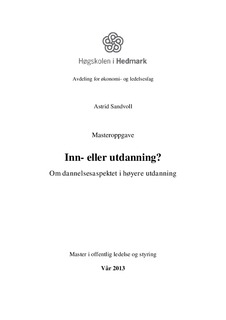| dc.contributor.author | Sandvoll, Astrid | |
| dc.date.accessioned | 2013-06-28T07:33:10Z | |
| dc.date.available | 2013-06-28T07:33:10Z | |
| dc.date.issued | 2013 | |
| dc.identifier.uri | http://hdl.handle.net/11250/132467 | |
| dc.description | Mastergradsoppgave MPA, 2013. Erfaringsbasert master, 30 st.p. | no_NO |
| dc.description.abstract | Begrepet dannelse har alltid vært nært knyttet til utdanning, men har hatt ulikt fokus opp gjennom historien. Begrepet har fått økt fokus de senere år, bl.a. takket være Dannelsesutvalget som i 2009 la frem sin rapport «Kunnskap og dannelse foran et nytt århundre». Begrepets natur vanskeliggjør en enhetlig og tydelig definisjon, men enkelte karakteristika går igjen i beskrivelsene av hva danning er, eller bør være. Disse karakteristika er forsøkt identifisert i et utvalg studier ved en utvalgt høgskole i denne studien. Formålet ved studien er å belyse dannelsesaspektet som en del av samfunnsoppdraget: Oppfyller institusjonen sitt samfunnsoppdrag med hensyn til dannelsesaspektet? En empirisk studie av dokumenter er gjennomført for å kartlegge på hvilken måte dannelse faktisk fremstår som en del av høyere utdanningsinstitusjoners samfunnsoppdrag. Dokumentstudien viser at det ikke foreligger tydelige føringer i styringsdokumenter som definerer hvordan begrepet skal forstås og på hvilken måte dannelse skal være en del av utdanningene. En kvalitativ undersøkelse ble deretter gjennomført for å belyse fenomenet på studienivå ved høgskolen.
Innhold i begrepet dannelse, og dannelsens plass i utdanningene viser seg å være sprikende. 6 ulike case i studien representerer ulike fagområder fra ulike nivåer i høgskolesystemet. Det er størst sammenfall i begrepsbruk mellom profesjonsutdanninger som er styrt av overordnede rammeplaner. Funnene belyses med forklaringer fra organisasjonsteorien. Idéer, eller i denne sammenheng begreper som organisasjon må forholde seg til på ulike tidspunkt, kan karakteriseres som moter eller myter. Organisasjonen forholder seg til disse på ulike vis; ved å oversette og implementere begrepene, og/eller ved å ta i bruk begrepene på en overfladisk måte for å opprettholde organisasjonens legitimitet. Oversettelsesprosessen foregår på ulike vis og påvirkes av ulike faktorer. Ved høgskolen viser det seg at fagtilhørighet spiller en avgjørende rolle i oversettelsen av begrepet. På samme måte ilegges også begrepet samfunnsoppdrag ulik betydning innenfor organisasjonen. Men til forskjell fra dannelse har dette begrepet en mer avklart betydning i form av overordnede definisjoner. Begrepene oppfattes som viktige og som en del av høgskolens eksistensgrunnlag. Forståelsen av innholdet i begrepene er likevel ikke uniform, og dette forklares i oppgaven med translasjonsteori. | no_NO |
| dc.description.abstract | Engelsk sammendrag (abstract): The concept of formation or general education has always been closely linked to education, but had different focuses throughout history. The concept has received increased attention in recent years, including thanks to Dannelsesutvalget, which in 2009 presented its report "Education and general education in front of a new century." The term nature complicates a unified and clear definition, but certain characteristics recur in descriptions of what formation is, or should be. These characteristics are tried identified in a variety of studies at a university college chosen in this study. The purpose of the study is to elucidate the formation concept as part of the social mission; Meets the institution's social mission with regard to the concept of formation? An empirical study of documents is carried out to ascertain the manner in which formation actually appears as part of the higher education community projects. The document study showed that there are no clear guidelines in the key documents that define how the term should be understood and the way in which formation should be part of higher education. A qualitative study was then conducted to elucidate the phenomenon at this university college.
Contents of the concept and its appearance in the courses appear to be inconsistent. Six different cases in this study represent different disciplines from different levels. The greatest overlap in terminology is found in vocational programs that are controlled by overall curriculums. The findings are highlighted with explanations from organization theory. Ideas or concepts that the organization has to deal with at different times can be characterized as fads or myths. The organization relate to them in different ways, by translating and implementing concepts, and / or by applying the concepts in a superficial way to maintain the organization's legitimacy. The translation process takes place in different ways and are influenced by various factors. In this university college, it appears that affiliation to a discipline plays a crucial role in the translation of the term. Likewise imposes the term social mission different meanings within the organization. But formation, this term has a more clarified significance in terms of overall definitions. The concepts are perceived as important and as part of the college's existence. The understanding of the nature of the concepts is still not uniform, and this is explained in the task of translation theory. | |
| dc.language.iso | nob | no_NO |
| dc.subject | dannelse | no_NO |
| dc.subject | Dannelsesutvalget | no_NO |
| dc.subject | utdanning | no_NO |
| dc.subject | samfunnsoppdrag | no_NO |
| dc.subject | høgskoler | no_NO |
| dc.subject | institusjoner | no_NO |
| dc.subject | empirisk metode | no_NO |
| dc.subject | dannelsesaspekter | no_NO |
| dc.subject | casestudie | no_NO |
| dc.title | Inn- eller utdanning? Om dannelsesaspektet i høyere utdanning | no_NO |
| dc.title.alternative | The Concept of Formation in Higher Education | en |
| dc.type | Master thesis | no_NO |
| dc.subject.nsi | VDP::Social science: 200::Political science and organizational theory: 240 | no_NO |
| dc.source.pagenumber | 71 s. | no_NO |
